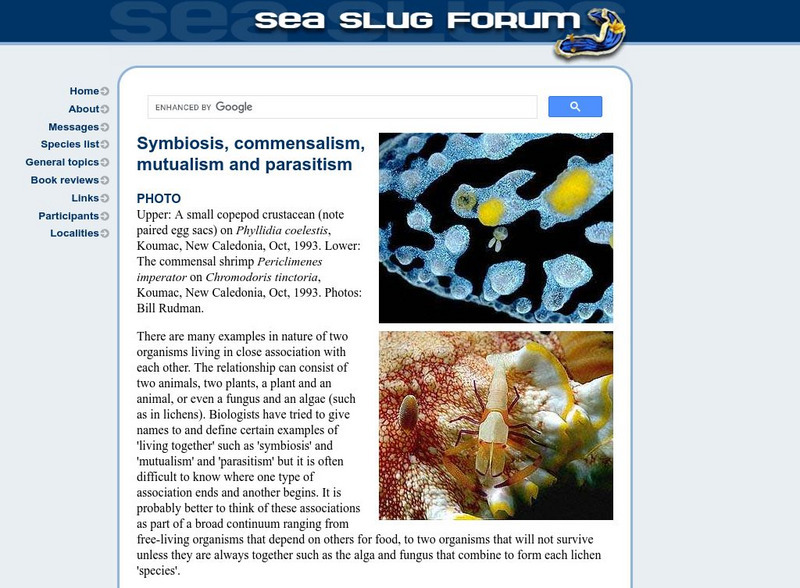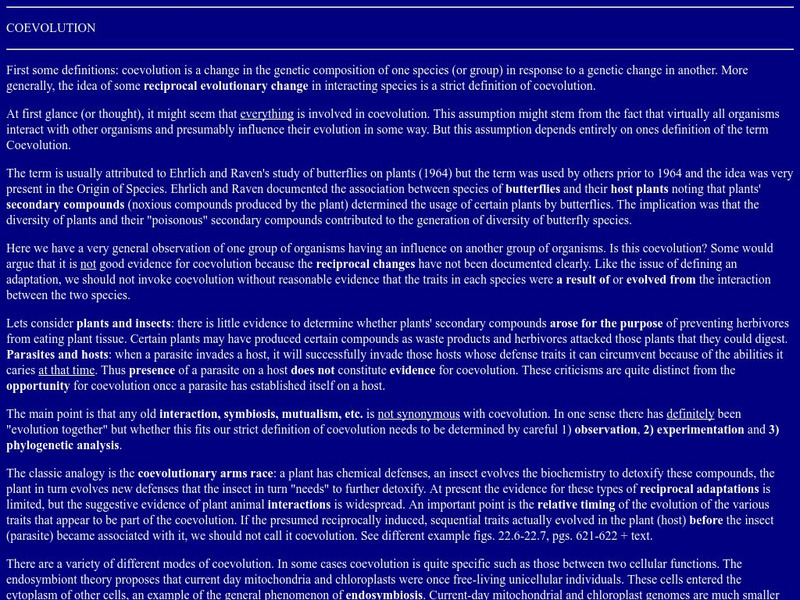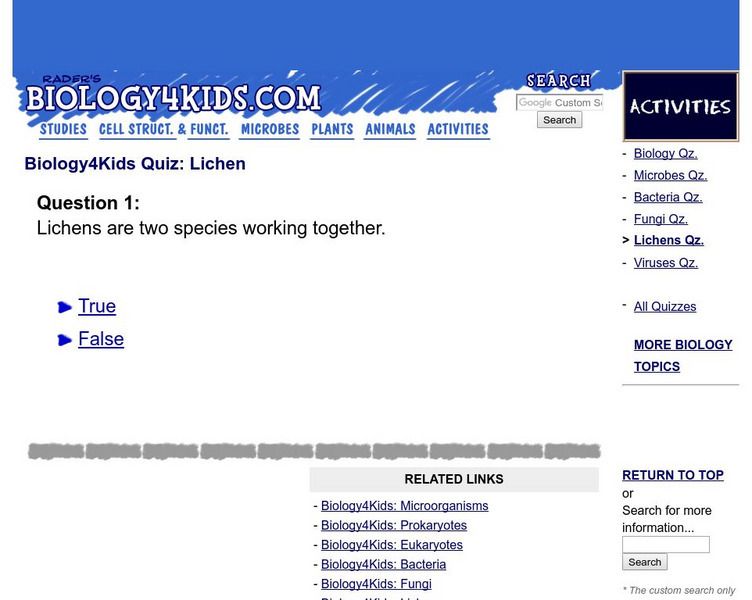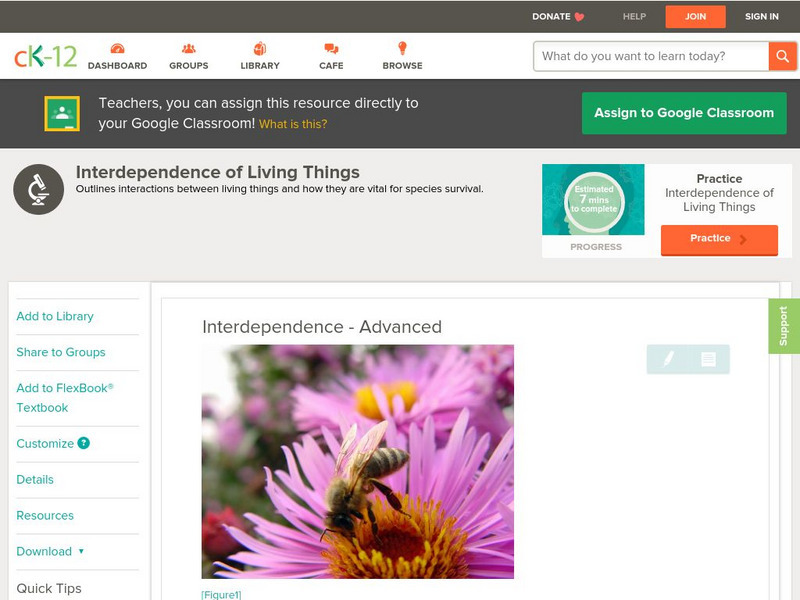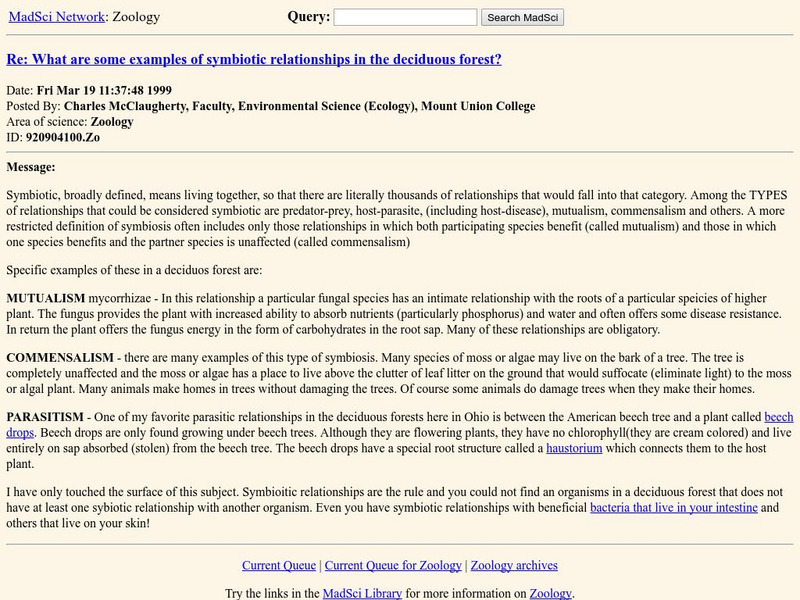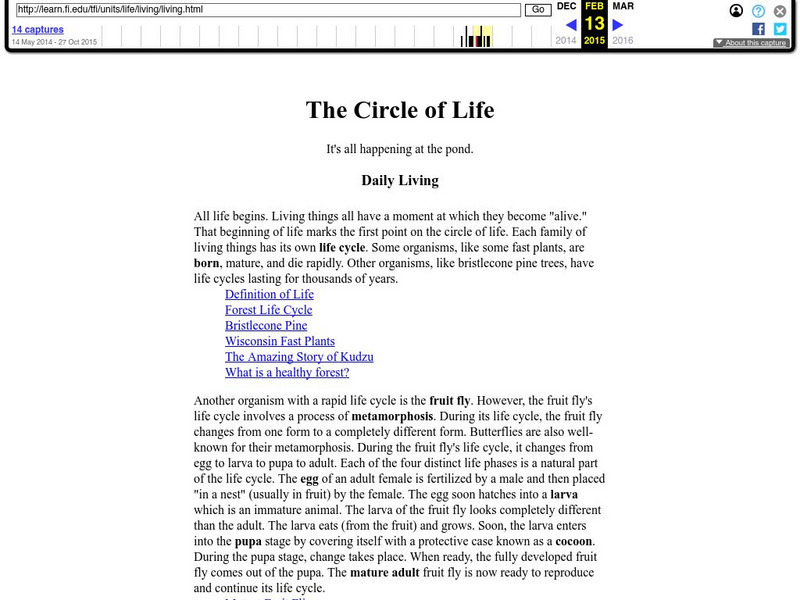Encyclopedia of Earth
Encyclopedia of Earth: Evolutionary Biology: Symbiosis
Article describes the different types of symbiosis, some of which are of mutual benefit, and others not. It also explains the differences between endosymbiosis and exosymbiosis, where one organism lives either inside or else upon the...
National Geographic
National Geographic: Ecological Relationships
In this lesson, students learn about different types of ecological relationships, including symbiosis, mutualism, commensalism, and parasitism. Includes handouts and a vocabulary list with definitions.
Nature Conservancy
The Nature Conservancy: The Importance of Biological Interactions
Organisms have a variety of relationships. In this instructional activity, students learn to categorize relationships according to their impact on organisms and the terminology for these biological interactions.
NC State University
North Carolina State University: Symbiotic Relationships
Includes a description of symbiosis in general, then lists and defines types of symbiosis including mutualism, commensalism, parasitism, competition, and neutralism. Includes a chart which summarizes the different types of relationships....
Other
The Sea Slug Forum: Symbiosis and Commensalism
Question and answer site that contains a discussion of commensalism as it pertains to sea slugs. Nice photographs of aquatic commensalistic relationships.
Massachusetts Institute of Technology
Mit: Open Course Ware: Courses: Civil Environmental: Ecology I: The Earth System
College-level online course highlighting the fundamentals of ecology. Course topics include coevolution of the biosphere, geosphere, atmosphere, and hydrosphere; photosynthesis and respiration; and the carbon, nitrogen, and water cycles....
Texas Education Agency
Texas Gateway: Symbiosis
Given scenarios or illustrations, the student will determine the nature and type of relationship between organisms, including parasitism, commensalism, mutualism, and competition.
PBS
Pbs Learning Media: Coral Reef Connections
Dive in and explore what makes this beautiful world so fragile. In this Web feature, from the PBS series "Evolution," discover how coevolution has shaped the ecological relationships among reef creatures.
University of Nebraska
University of Nebraska State Museum: Brazil Nut Tree Community
Investigate the numerous symbiotic relationships that exist between the Brazilian Nut Tree and six other organisms in its community.
Ohio State University
Ohio State University: Concepts of Plant Ecology
An advanced discussion of plant interactions and relationships. Energy flow, nutrient cycling and succession are discussed. Try the quiz to check your understanding.
Brown University
Brown University: Coevolution
This page provides a strict definition for coevolution, engages in a discussion of specific examples, and explains why they are or aren't coevolution.
Other
Wild Birds Umlimited: Clark's Nutcracker and Pine Forests
Here you can get a good understanding of mutualism. Site includes great photos of the Clark's Nutcracker. Interesting information with great photos.
Scholastic
Scholastic: Study Jams! Science: Ecosystems: Symbiosis
Symbiosis is featured in this video to help students understand the process through an engaging video. Know terms like parasites and mutualism to be successful on the test.
Biology 4 kids
Biology4 Kids: Quiz: Lichens
Take this ten-question review quiz over the hybrid organism, lichen. Read more about each question after an incorrect answer is given.
CK-12 Foundation
Ck 12: Biology: Interdependence of Living Things
[Free Registration/Login may be required to access all resource tools.] Covers interactions between organisms.
CK-12 Foundation
Ck 12: Biology: Symbiosis
[Free Registration/Login may be required to access all resource tools.] Overview of symbiotic relationships.
CK-12 Foundation
Ck 12: Life Science: Symbiotic Relationships of Fungi
[Free Registration/Login may be required to access all resource tools.] Fungi don't live in isolation. They often interact with other species. In fact, fungi can be dependent on another organism for survival. When two species live close...
CK-12 Foundation
Ck 12: Life Science: Bacteria Nutrition
[Free Registration/Login may be required to access all resource tools.] Like all organisms, bacteria need energy, and they can acquire this energy through a number of different ways. Learn more about bacteria nutrition in this learning...
MadSci Network
Symbiotic Relationships in the Deciduous Forest
A brief definition of symbiotic, followed by explanations of mutualism, commensalism, and parasitism.
The Franklin Institute
The Franklin Institute Online: The Circle of Life
The Franklin Institute explores how "each family of living things has its own life cycle." Links to many resources are woven together with narrative at this site.
Science Struck
Science Struck: Symbiotic Relationships in the Deciduous Forest
Explains what a symbiotic relationship is, the five main types of symbiosis, and provides examples of symbiotic relationships among living things in a deciduous forest.
CommonLit
Common Lit: "Can't We All Just Get Along?" by Bird Brain Science
Earth is full of a variety of living things that interact with one another in many different ways. This informational text explains the various different types of relationships they can have with one another. It also offers guided...
Science Struck
Science Struck: Mutualism Relationships
Learn how mutualism benefits the organisms in a symbiotic relationship and what the different types of mutualism are. Provides lots of examples.
CK-12 Foundation
Ck 12: Biology: Symbiotic Relationships of Fungi
[Free Registration/Login may be required to access all resource tools.] Discusses parasitic and mutualistic relationships of fungi.






